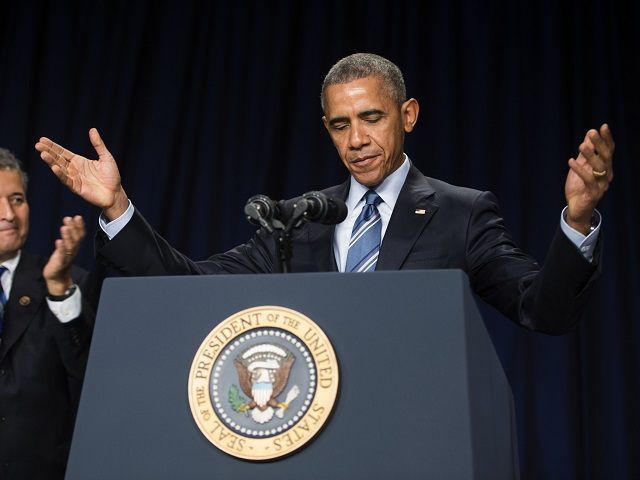Security conscious Americans are hard-pressed to be optimistic after reading the U.S. Intelligence Community’s Worldwide Threat Assessment for 2016.
The document, prepared by 16 U.S. intelligence agencies, chronicles the enormous security threats currently facing the United States and global community seven years into Barack Obama’s presidency. And it prompts many Americans to ask: what happened?
For President Obama and his supporters, it wasn’t supposed to turn out this way. The beginning of the Obama presidency in 2009 was met with raised expectations for a better and safer world, for Americans and everyone else. None more so than the Norwegian Peace Committee which gave President Obama its most coveted award, the Nobel Peace Prize, a mere nine months into his presidency for, among other things, his willingness to make greater use of the United Nations and other international institutions in resolving the world’s most difficult problems.
During his administration, President Obama followed his global worldview ideological impulses and pursued the Norwegian Peace Committee and UN’s main agenda items in a way that surely pleased them, while dismaying those who believe strongly in U.S. sovereignty and America’s traditional role as Free World leader.
U.S. Director of National Intelligence James Clapper’s recent testimony to the U.S. Congress and the American people on current security threats strongly suggest that President Obama’s approaches to making the world a better and safer place haven’t worked. Consider some of the things DNI Clapper reported:
- “Violent extremists are operationally active in about 40 countries. Seven countries are experiencing a collapse of central government authority, 14 others face regime threatening, or violent, instability or both. Another 59 countries face a significant risk of instability through 2016.”
- “There are now more Sunni violent extremist groups, members, and safe havens than at any time in history. The rate of foreign fighters traveling to the conflict zones in Syria and Iraq in the past few years is without precedent. At least 38,200 foreign fighters — including at least 6,900 from Western countries — have traveled to Syria from at least 120 countries since the beginning of the conflict in 2012.”
- “Iran continues to be the foremost state sponsor of terrorism and exerts its influence in regional crises in the Mid-East through the Islamic Revolutionary Guard Corps — Qods Force, its terrorist partner Lebanese Hezbollah, and proxy groups. Iran and Hezbollah remain a continuing terrorist threat to US interests and partners worldwide.”
- “North Korea carried out its fourth nuclear test; China continues to modernize its nuclear missile force and is striving for a secure, second-strike capability; Russia continues to have the largest, and most capable, foreign nuclear-armed ballistic missile force, and developed an intermediate range cruise missile that violates the INF Treaty; and Iran probably views the JCPOA (Joint Comprehensive Plan of Action) as a means to remove sanctions while preserving nuclear capabilities.”
- “The record level of migrants, more than one million arriving in Europe, is likely to grow further this year. Migration and displacement will strain countries in Europe, Asia, Africa and the Americas. There are now some 60 million people who are considered displaced globally.”
Add to all that bad news from Freedom House’s 2016 report, which stated that “Global freedom (e.g., democracy and human rights) declined for the 10th consecutive year in 2015, as economic pressures and fear of unrest led authoritarians to crack down on dissent, while migration and terrorism fueled xenophobia in democracies.”
With global terrorism, nuclear proliferation, and human suffering on the rise, and global freedom in retreat, many Americans and concerned global citizens desperately look to the United States for leadership, especially in the wake of urban terrorist attacks mounted by radical Islamic jihadists in places like Paris, Chattanooga, San Bernardino, and elsewhere.
Yet, the centerpiece of the Obama administration foreign policy and national security strategy remains “strategic patience,” a concept built around not immediately reacting to global crises, and instead, looking to the international community (e.g., the UN and other global institutions) to resolve them as the Norwegian Peace Committee enunciated in its award to him – and something history shows is akin to Waiting for Godot.
In a recent South Carolina Tea Party Coalition Conference – which featured GOP presidential candidates Donald Trump, Ted Cruz and others as speakers – retired U.S. Marine Corps Lt. Col. and Naval Academy graduate Bill Cowan offered the audience his interpretation of the president’s “strategic patience” strategy. He said it means the next president or president after that will have to deal with the repercussions of President Obama’s dubious foreign policy and national security decisions and inaction.
History has been kind to American presidents like Lincoln, Truman, Kennedy, and Reagan who never received Nobel Peace Prizes but who arguably made the world a better and safer place for Americans and the global community and presidential successors by acting decisively in the face of enormous political and security challenges during the Civil War (Nobel Peace Prize didn’t exist then), WWII, and confrontations with the former Soviet Union, respectively.
With the latest U.S. Intelligence Community Worldwide Threat Assessment, it is clear that President Obama faces grave global security challenges as he completes the last several months of his presidency. And how he acts on these challenges will determine his legacy. Let’s hope it is in the best interest of the people of the United States of America, and the global humanity.
Fred Gedrich is a foreign policy and national security analyst. He served in the U.S. departments of State and Defense.

COMMENTS
Please let us know if you're having issues with commenting.